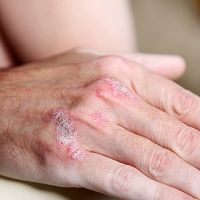Article
Is Psoriatic Disease Hereditary?
Author(s):
Recent research has discovered evidence potentially supporting a parent-of-origin effect in psoriatic disease.

Recent research has discovered evidence potentially supporting a parent-of-origin effect in psoriatic disease.
The study, published in the journal Arthritis Care & Research, explored the hereditary effect in a cohort of 849 first-degree psoriatic disease patients. Researchers took self-reported family history from the patients from Toronto and Newfoundland, which satisfied the Classification of Psoriatic Arthritis criteria.
Experts compared proportions of probands with paternally and maternally transmitted psoriatic disease by McNemar’s and chi-square tests. Logistic regression was also used to compare baseline clinical and genetic characteristics of probands with paternally and maternally transmitted disease.
Of the group, there were 57% of affected fathers compared to 43% of the affected mothers. Results indicated the paternal transmission bias was evident in PsA and PsC (cutaneous psoriasis without arthritis) probands, even though it didn’t reach statistical significance in PsC probands.
Also, the proportion of paternal PsC—proband PsA pairs (161 of 214 paternal transmissions [75%]) was significantly larger than maternal PsC–proband PsA pairs (103 of 161 maternal transmissions [64%]).
In supporting their hypothesis, the authors concluded, “We have provided further epidemiologic evidence of a paternal transmission bias in psoriatic disease.”





